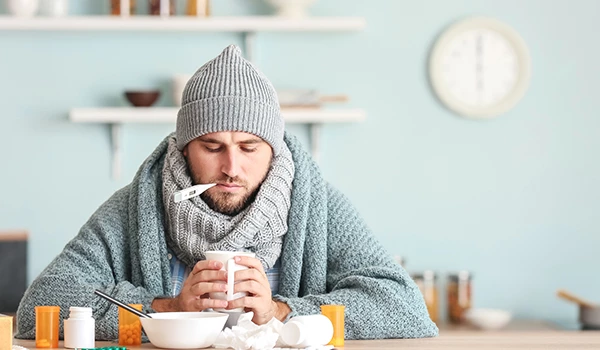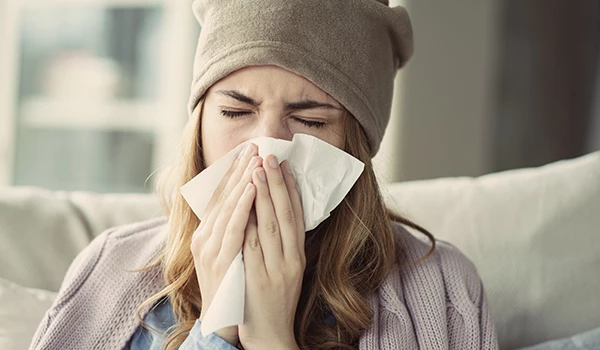Select your country
Websites worldwide
Select a country to go to the website of the respective STADA sales company.
Australia (1)
Austria (1)
Belarus (1)
Belgium (1)
Bosnia-Herzegovina (1)
Bulgaria (1)
China (1)
Croatia (1)
Czech Republic (2)
Denmark (1)
France (1)
Hungary (1)
Ireland (1)
Italy (1)
Montenegro (1)
Netherlands (2)
Poland (1)
Portugal (1)
Romania (1)
Serbia (1)
Slovakia (1)
Slovenia (1)
Spain (1)
Switzerland (1)
Thailand (1)
The Phillippines (1)
United Kingdom (3)
Vietnam (2)
It starts with a runny nose, cold shivers, achy limbs and an overall “ugh” type of feeling: The common cold is our eternal enemy once we move back into the colder months of the year and our immune system is put to the test. With Covid, many have noticed that their annual spell of the regular cold has disappeared. Surely we have face coverings and minimum distances to thank for that. But what will happen post Covid when the safety measures that are currently in place are.
Not too long ago, the tenor around whether to stay at home with a cold may have sounded something like this: “A little sniffle won’t keep me from coming in”, “There’s simply too much to do” or “I don’t want to let down my colleagues”. In record time, the pandemic has forced us to re-evaluate how we deal with and look after our health – even when it comes to minor illnesses like the common cold. The STADA Health Report 2021 has revealed that many Europeans have a newfound appreciation for their health, thus feeling more inclined to look after themselves better. But: Social pressure might also come into play, as almost 1 in 2 are convinced that even post Covid, one might have to expect dirty looks when coughing, sneezing or being otherwise (and visibly) unwell in public.

Pharmacist most important contact person despite popularity of home remedies
It is safe to say that people in Europe have very different ways of dealing with an oncoming cold. 38 percent prefer a gentle approach and rely on home remedies such as hot soups, tea, hot water bottles and bed rest to overcome an infection. Germans, Austrians (57 percent each) and the Swiss (53 percent) are Europe’s strongest advocates for such measures.
Just over 1 in 3 Europeans (34 percent) also support their immune system by taking supplements such as vitamins, minerals and probiotics which can help fend off an infection. Such supplements are particularly popular in Serbia (59 percent), Poland (52 percent), and the Czech Republic (50 percent). Among all Europeans, people in France (20 percent) and Belgium (21 percent) are the wariest of nutritional supplements.

First-defense products such as nasal and mouth sprays are the weapons of choice for 1 in 4 (26 percent)– Russians (52 percent) are twice as likely to reach for them as the average European. The same goes for combination products which address a range of possible symptoms – 33 percent of Russians approve of them, compared to 16 percent of Europeans.
In Portugal and Spain, people are less likely to take treating their symptoms into their own hands – they prefer to get an opinion from a specialist instead: 36 and 34 percent respectively consult their pharmacist first. Across Europe, 1 in 5 turn to their pharmacist for treatment options for a common cold. By comparison, only 9 percent make a doctor’s appointment right away.
Has Covid actually changed our perception of infectious diseases?
With a good balance between patience, rest and perhaps medication, a common cold often goes away within a couple of days. However, the resting part tends to be wildly underestimated. We sometimes feel that we need to take on everyday life regardless of whether we are feeling a bit under the weather. This has often led to people coming into work while they are still contagious, possibly passing on whatever is making them ill to their colleagues.
With Covid, this behavior has received a new status of unacceptability. So much so, in fact, that only 7 percent of Europeans are convinced they need not fear strange looks from others when sneezing or coughing in public in the future. On the contrary, 45 percent of Europeans are convinced that such actions will raise the attention of others for fear of infection. In Spain, Portugal and Italy, this goes for 55 percent, while Russians and the Dutch have a more relaxed outlook (35 and 37 percent respectively). 18 percent of Europeans plan to take preventive action by strengthening their immune system, while 1 in 5 Europeans believe that once Covid is history, the fear of infections will also decrease. On the other hand 10 percent say they will stay home completely with common colds in the future because the public is more nervous about cold symptoms.
So one might hope that Europeans will become more willing to at least temporarily self-isolate at home when they have a cold. In the 2020 edition of the STADA Health Report, the survey for which was completed before the outbreak of Covid in Europe, 19 percent of the surveyed European population then in employment said they stayed home from work when they had an infection, while 81 % said they even went to work regardless. It is likely that this number has decreased significantly after the pandemic - to the benefit of all.
STADA Health Report 2021: Representative online study by Kantar on behalf of STADA.
Research time frame: March through April 2021.
Sample: Around 2,000 respondents each from Austria, Belgium, the Czech Republic, Germany, France, Italy, the Netherlands, Poland, Portugal, Russia, Serbia, Spain, Switzerland, Ukraine and the United Kingdom.


